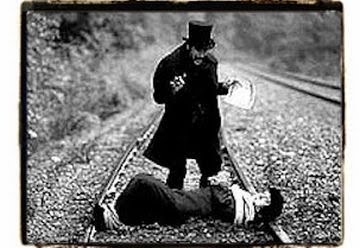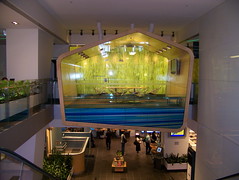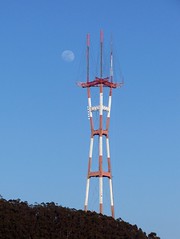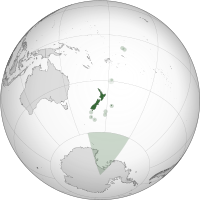Last week the ever-interesting Barbara Fister observed over on Inside Higher Ed,
People are beginning to notice that big publishers are not really all that interested in authors or readers; they are interested in consolidating control of distribution channels so that the only participants in culture are creators who work for little or nothing and consumers who can only play if they can pay.
Barbara elegantly collapses into one sentence the last several years of the ebook wars and, even more importantly, identifies all stakeholders in the reading ecology: not just publishers and libraries, but authors and readers.
The Growing Crisis
Over the last year or so, there has been spluttering (sometimes from me) at individual publishers such as HarperCollins (they of “26 checkout” fame), distributor-packagers such as Overdrive, and of course, the idiot library administrators who sign contracts they obviously haven’t read, or they would never have entered into those agreements, right? (That spluttering definitely didn’t come from me, being one of those administrators.)
But Barbara is pointing out that while the problem has many moving parts, the entire reading ecology is at risk; we are, in her terms, in an “apocalypse.” It is really nothing less than an outright assault on fair use; the publishing-industrial complex won’t be happy until readers are paying, not just by the title, but by the page-turn.
Barbara and I have an interesting convergence: we are both librarians-authors-readers (except she can write entire books, while my attention span ends at the essay). By author, I mean (full disclosure: HUSTLE AHEAD!) non-industry writing, such as the forthcoming The Cassoulet Saved Our Marriage (Roost Books, Fall, 2012; edited by Lisa Catherine Harper and Caroline Grant), in which you will find my revised and republished essay, “Still Life on the Half-Shell” (first published in Gastronomica) about oysters, the locavore movement, and how I came to terms with life in Tallahassee. My essay includes exquisitely clear instructions on eating oysters Southern-style (complete with a photograph), making Cassoulet an obvious “must buy” for all library collections.
But my point isn’t about whether I am expecting to make a living from essays such as “Half-Shell.” My day job is my income; I can’t even remember if I am getting a small one-time payment, though I had such good editorial input from Lisa and Caroline that the revision process was its own mini-post-grad workshop, and I have a food essay floating out there that is significantly better for the lessons learned for “Half-Shell.”
My point is that it’s important, both ethically and strategically, for advocates of the right to read to understand that creators should have the option and the right to make a living from their creations, and that our advocacy, right now, at this moment in history, is crucial to ensure that right.
It’s also the reader’s right to support creators, which they can do either directly (buy my book!) or indirectly (fund libraries, and they will buy my book). Some of us in society will “buy” books, by way of funding libraries, that we never read ourselves or that we choose to purchase on our own, but we understand that the town pump benefits everyone — a take on the world that is less popular in certain circles, but only underscores our value to society.
What happened?
In the past, the writer-publisher-library-reader model had a modicum of equanimity. It is now obvious that the nature of the technology — the printed book — largely regulated that equanimity. All of us in the reading ecology — librarians, authors, repackagers, readers — are tied to the tracks by the Brobdingnagian power wielded by the highly consolidated publisher-industrial complex that is then magnified a thousand-fold by the conveniently elastic, virtual nature of digital publishing.
As Steve Lawson observes, publishers can get away with limiting access, so they limit it. As Kate Sheehan points out in a comment on her own post, publishers can cut us out of the conversation, so they cut us out. Though it has been proven time and again that library reading boosts individual book sales, that’s not good enough for for the publisher-industrial complex. They smell an opportunity, and their greed is overwhelming any vestige of decency or sense of social fairness.
Deep down, the publishing-industrial complex will not be satisfied until they can do away with those pesky librarians, they who broker reading as a public good, champion the right to read, and advocate for equitable access. Penguin invoked the term “friction,” in reference to the ease of checking out books; but I see the real “friction” as the Bonus Army of librarians, authors, and readers who are speaking truth to power. How convenient it would be if we were starved out of the reading ecology.
We’re also back to my ancient observation about Google: “don’t be evil” does not translate into “do be good.”
What is to be done?
I’m not a fan of…
- Dwelling at length on the supposed sins of any one publisher or redistributor; this isn’t just HarperCollins, Penguin, the other publishers who won’t even deal with Overdrive, or Overdrive. It’s bigger than that. (Note: I lay aside the Elsevier boycott, which works for other reasons, in a different situation and a different reading ecology.)
- Singling out individual libraries over their Overdrive contracts.
- Assuming Dilbertesquian cluelessness on the part of librarians struggling to provide ebooks to readers.
- Arguing that Information Wants To Be Free and therefore creators should work for free and make a living some other way. That’s not only naive, it leaves just one profiteer in the equation: publishers. (Again, this relates to the for-profit book industry. Scholarly publishing also relies on slave labor to line publishers’ purses — which is the point of the Elsevier boycott — but it’s a different ecology. There ain’t no such thing as a free lunch, but sometimes it’s hard to point to the money on the table.)
- Assuming “they” will solve the problem. Much as I appreciate ALA going to meet with big publishers, one of those publishers, Penguin, subsequently thumbed its beak at the reading ecology, withdrawing from Overdrive with a timing that can only be labeled impertinent.
- Indulging in magical thinking; the clock isn’t rolling backwards, and ebooks are here to stay.
I do think we need to…
- Recognize this crisis as a reading-ecology problem and a fight for the right to read, not just a public-library problem. It doesn’t matter that this has primarily been about Overdrive, whose customer base is overwhelmingly public libraries (though Overdrive has higher-ed customers, including Yale, Pitt, and my tiny library). We’re all part of the reading ecology.
- Inform and engage our stakeholders, such as the Free Library of Philadelphia is doing., and as Peter Brantley did through Publishers Weekly, though I was a little uncomfortable with his portrayal of public libraries. They aren’t all urban catchbasins, and strategically, we need the large middle-class voting base to understand their stake in this crisis.
- Study the structure of our reading ecology and have economists and other strategists propose workable solutions. I know there has been talk about “buying” Overdrive, but even if it were for sale, would acquiring the repackager/redistributor solve anything? We need some serious theory at work for us. This is made even more challenging because library “science” is an iffy discipline at best.
I wish I had more ideas, but I solicit yours.














